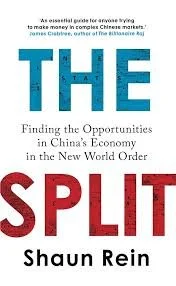A Tale of Four Cities
By Philip G. Duffy
America’s Counter-Revolution
By Sheldon Richman
Coming to Palestine
By Sheldon Richman
The Split
By Shaun Rein
A Short History of Man: Progress and Decline
By Hans-Hermann Hoppe
The Real Lincoln
By Thomas J. DiLorenzo
A Tale of Four Cities describes how different ideas about the creation of wealth published up to three centuries ago affect our thinking about how governments ought to relate to the private sector of the economy. It ties together the relatively unknown Irish banker, Richard Cantillon, with the more famous Adam Smith, as well as Karl Marx, Napoleon, Bismarck, Mussolini, Hitler and John Maynard Keynes.
“The small elite that won the day didn’t actually share the values and ideals that drove the war for independence from Britain. These ‘founders’ plotted and schemed to impose a new government that dramatically enhanced and centralized government power. Their stroke of genius in pulling off this coup d’etat was selling the Constitution as a means of guaranteeing freedom and limiting government. In fact, it was the opposite: the imposition of a new statist yoke to replace the one just cast off; the complete reversal of the hard-won freedom.”
~ Jeffrey Tucker, Forward
“According to Zionist propaganda, supported by successive U.S. administrations, Israel is a peace-loving, progressive, democratic country that is facing hordes of warring, ‘anti-Semitic’ Arabs…
In truth, Israel needs more to survive in its current undemocratic, racist, colonial form than a powerful army, nuclear arms, and blind U.S. support. It also needs to sustain, for as long as possible, the myth that it is a democratic haven in a tumultuous sea of authoritarian and violent Arabs, who are a threat not only to the Jewish people (all of them) but to Western civilization as well.
Richman’s is a book of political myth-busting, a craft that the author has mastered through many years of morally guided scholarship, painstaking research and an eloquent writing style. And, ultimately, this is the kind of unapologetic truth-telling that Israel fears most.”
~ Ramzy Baroud, Forward
“No other country, aside from maybe India, with its 1.4 billion population, has the growth potential that China has. But India’s per capita GDP is only one-fifth that of China’s…
Many pundits argue China is no longer investable and that capital is better deployed in other markets like India or Japan. It is true that the heyday of quick and easy profitmaking of the early 2000s to mid-2010s is gone, but there remain good opportunities to profit from urbanization, the rise of domestic Chinese technology powerhouses, and the continued growth of China’s middle class…
It would be a mistake to bet against the world’s second largest economy and to predict its economic collapse, as so many China watchers have predicted over the past 20 years.”
~ Shaun Rein, Prologue
“Drawing on his vast knowledge and Austrian insights, Hans addresses two questions. How did the family and private property originate? How did the Industrial Revolution get started? Readers will see how the development of secure property rights and the free market has been essential to human progress. The question for our times then is: Will these developments continue, to the great benefit of mankind, or will the state be able to thwart them?
In its use of economics and philosophy to illuminate history, A Short History of Man brings to mind such libertarian classics as Oppenheimer’s The State, Nock’s Our Enemy the State, and Chodorov’s The Rise and Fall of Society. A Short History of Man is an ideal introduction to the thought of a major social thinker and outstanding libertarian.”
~ Llewellyn H. Rockwell, Jr., Forward
“The War between the States settled by force whether states could secede. Once it was established that states cannot secede, the federal government, abetted by a Supreme Court unwilling to hold it to its constitutional constraints, was able to run amok over states’ rights, so much so that the protections of the Ninth and Tenth Amendments mean little or nothing today. Not only did the war lay the foundation for eventual nullification or weakening of basic constitutional protections against central government abuses, but it also laid to rest the great principle enunciated in the Declaration of Independence that ‘Governments are instituted among Men, deriving their just powers from the consent of the governed.’
The Real Lincoln contains irrefutable evidence that a more appropriate title for Abraham Lincoln is not the Great Emancipator, but the Great Centralizer.”
~ Walter E. Williams, Forward





